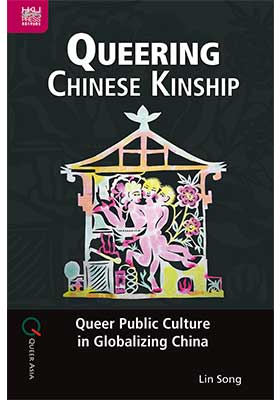Queering Chinese Kinship
Queer Public Culture in Globalizing China
(酷兒中國親屬關係:全球化中國的酷兒公共文化)
ISBN : 978-988-8528-73-8
December 2021
172 pages, 6″ x 9″, 9 b&w illus.
- HK$495.00
Ebooks
Also Available on
What does it mean to be queer in a Confucian society in which kinship roles, ties, and ideologies are of such great importance? This book makes sense of queer cultures in China—a country with one of the largest queer populations in the world—and offers an alternative to Euro-American blueprints of queer individual identity. This book contends that kinship relations must be understood as central to any expression of queer selfhood and culture in contemporary cultural production in China. Using a critical approach—“queering Chinese kinship”—Lin Song scrutinizes the relationship between queerness and family relations, and questions Eurocentric queer culture’s frequent assumption of the separation of queerness from blood family.
Offering five case studies of queer representations across a range of media genres, this book also challenges the tendency in current scholarship on Chinese and East Asian queerness to understand queer cultures as predominantly counter-mainstream, marginal, and underground. Shedding light on the representations of queerness and kinship in independent and subcultural as well as commercial and popular cultural products, the book presents a more comprehensive picture of queerness and kinship in flux and highlights queer politics as an integral part of contemporary Chinese public culture.
“The book makes a strong contribution to Asian queer studies through an in-depth theorization of queer kinship in the Chinese context, a comprehensive coverage of different types of queer media and popular culture, and an innovative discussion of homonormativity in the context of contemporary China. In a fast-developing and very competitive academic field, this book stands out as an important contribution.” —Hongwei Bao, University of Nottingham
“Queering Chinese Kinship represents the cutting edge of Chinese queer studies. Its sophisticated media analyses and provocative theoretical contentions reveal two central paradoxes: the interdependence of queerness and kinship despite China’s notoriously homophobic patriarchal familism, and the flourishing of queer public culture in spite of its infamously restrictive media environment. Brilliantly demonstrating how queer possibility emerges through a confluence of familial, media, state, and market forces, this book is a joy to read and a major contribution to the field.” —Fran Martin, University of Melbourne





